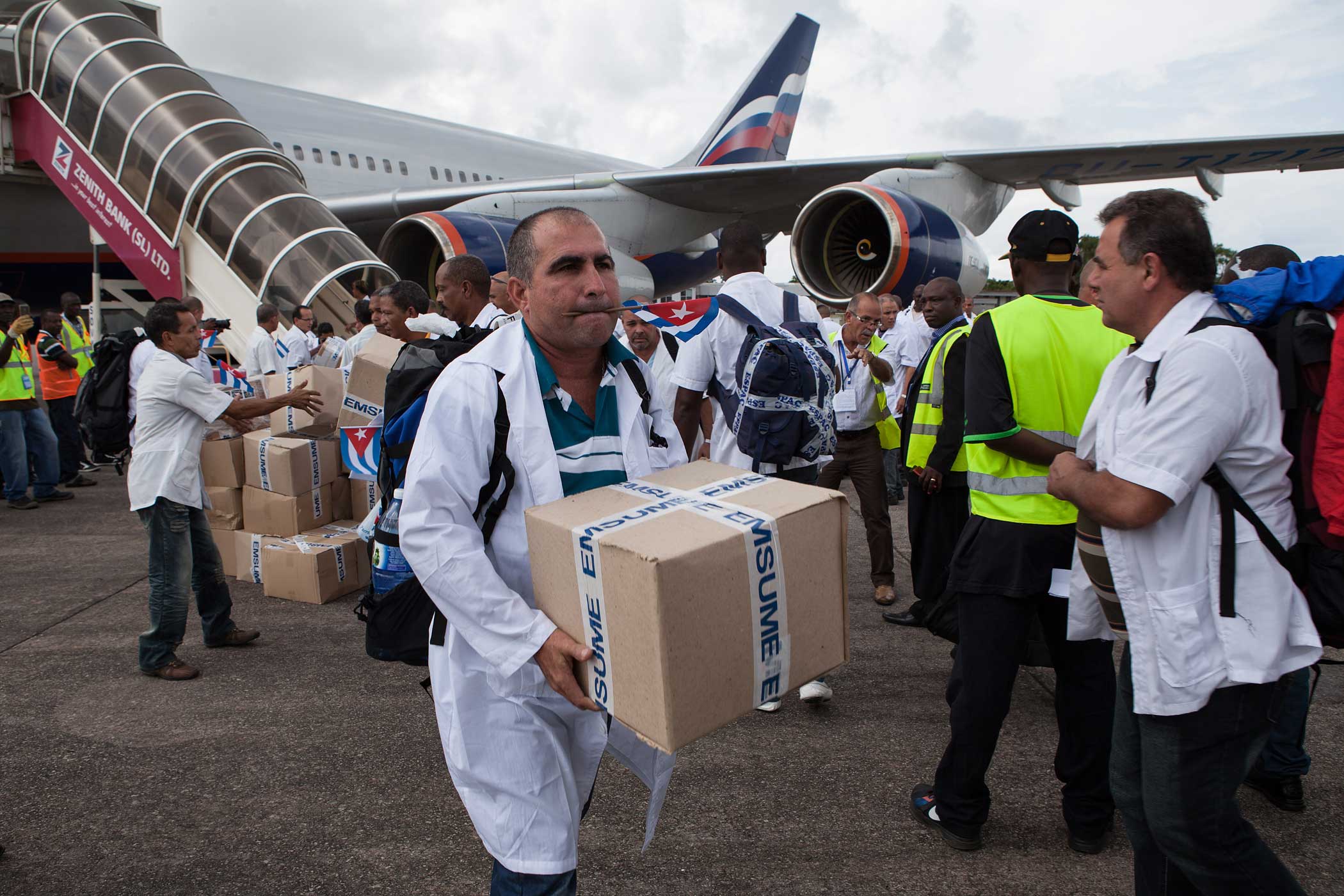
As the first nation to dedicate hundreds of health care workers to West Africa, Cuba is an unlikely hero in the Ebola outbreak.
In spite of not being among the wealthiest countries, Cuba is one of the most committed when it comes to deploying doctors to crisis zones. It has offered more than 460 Cuban doctors and nurses to West Africa, and currently, 165 are working there under the direction of the World Health Organization (WHO). More than 50,000 health care workers from Cuba are working in 66 countries around the world.
“Cuba is world-famous for its ability to train outstanding doctors and nurses,” said WHO director Margaret Chan in a Sept. press conference announcing Cuba’s surge of health care workers. In the same meeting, Cuban Minister of Health Roberto Morales Ojeda called on all countries to “join the struggle against this disease.”
But why is Cuba so uniquely prepared to treat Ebola? It comes down to a national priority that even has its own name, coined by academics: “Cuban Medical Internationalism.”
Cuba’s global health crisis response system is a Doctors Without Borders-like program, but instituted by the government. When Cuban doctors graduate medical school, they are given the opportunity to volunteer to be called upon for medical missions, like an Ebola outbreak or a natural catastrophe. Often, these are one to two-year commitments. To prepare for something like Ebola, health care workers not only undergo aggressive training for the specific disease they are treating, but they also take courses on the region’s culture and history as well.
“This is something built into the psyche of Cuban doctors and nurses—the idea that ‘I am a public servant,'” says Gail Reed, co-founder of Medical Education Cooperation with Cuba (MEDICC). “It’s coming from a commitment to make health care a universally accepted right.”
It started around 1960, shortly after the Cuban Revolution. A massive earthquake killed up to 5,000 people in Chile, and Cuba sent health care workers into the disaster aftermath. A few years later, a medical team of more than 50 people went into war-torn Algeria. In 1998, two major hurricanes—Georges and Mitch—ravaged Latin America and the Caribbean. Once again, Cuba went in. Even during Hurricane Katrina, a team of Cuban doctors trained to go into the U.S., but President Bush said it wasn’t necessary.
In 1998, Cuban medical teams discovered that they were treating a lot people who had never before had access to doctors, and they decided that leaving the health care systems as they found them was irresponsible. So Cuba founded the Latin American Medical School (ELAM), which offers scholarships to low-income students from around the world with the expectation that they will graduate and return to their home countries as health workers.
“There are not many schools founded on the belief that poor people can become doctors and serve their community and be part of the solution,” says Reed. More than 23,000 physicians from low-income communities in 83 countries (even the U.S.) have graduated from ELAM, and nearly 10,000 are currently enrolled.
Not surprisingly, Cuba’s leadership in the current Ebola epidemic has become political in the U.S.—Republicans are angry that a CDC worker recently went to Cuba for an Ebola meeting. And many argue that Cuba’s motivations aren’t purely altruistic. Some countries pay Cuba for their services, though price tags differ by country.
Others argue that Cuba’s deep reverence for solidarity among the marginalized is the real motivator and that working in countries that don’t provide adequate care to their own citizens is a political statement. Besides payment, Cuba also gains international goodwill and cooperation between countries. “The very fact that Cuba is the only other nation than the United States to contribute human resources to the Ebola crisis in a big way creates enormous international political capital, especially when most nations are unwilling to send their own people into the center of the calamity,” says Robert Huish, an assistant professor of international development studies at Dalhousie University in Canada.
On Oct. 17, Fidel Castro wrote an op-ed in the country’s state-run newspaper, arguing the U.S. and Cuba should work together on Ebola, if only for better coordination. “We will happily cooperate with U.S. personnel in this task, not in search of peace between these two states which have been adversaries for so many years, but rather, in any event, for World Peace, an objective which can and should be attempted,” Castro wrote.
At the very least, the Cuban model has a message for the international community: that local people can work for the greater health of their homelands, and that constant preparation is more sustainable than being caught off-guard. “Cuba’s lesson for us is that health, and global health in particular, needs to be addressed with pro-active, forward-looking commitment to strengthening health systems, not just by reacting to [disaster],” says Huish. Aid groups like the Red Cross and Doctors Without Borders have been calling for more physical boots on the ground, and so far Cuba has been the only country well poised to answer that call.
More Must-Reads from TIME
- Cybersecurity Experts Are Sounding the Alarm on DOGE
- Meet the 2025 Women of the Year
- The Harsh Truth About Disability Inclusion
- Why Do More Young Adults Have Cancer?
- Colman Domingo Leads With Radical Love
- How to Get Better at Doing Things Alone
- Michelle Zauner Stares Down the Darkness
Contact us at letters@time.com